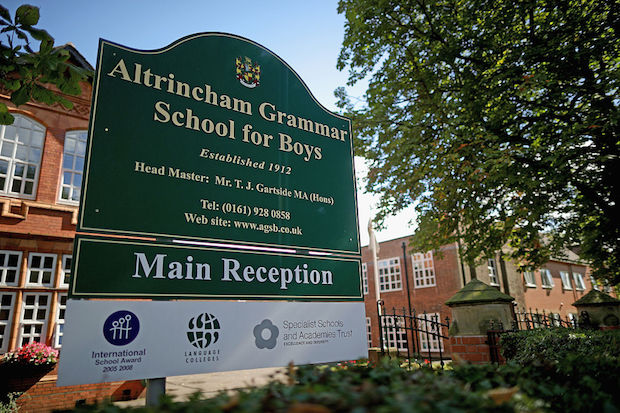There’s a good reason and a bad reason why David Cameron hasn’t added his mite to the argument about the reintroduction of grammars, which his Education Secretary, Nicky Morgan, sounded off about yesterday. The good reason is that it would be the worst of form for the former Tory PM to diss his successor, even if he disagrees with her. The bad reason is that he’s got a dog in this fight; his son Elwen. You remember all the fuss about the rumour that little Elwen might be going to a feeder prep to St Paul’s, the private school? The Camerons invoked media privacy to see off discussion of that topic. Well, if true, and I haven’t checked since, it gives Mr Cameron a very particular take on the matter of academic selection. Because the whole point of the feeder preps is to prepare children to jump through the hoops that constitute the admissions exams for – to pluck an example out of thin air – Eton.
The amount of frantic tutoring that goes on in addition to placing children in the fee paying preps to get them to pass those exams is quite astonishing for those of us outside the system. I tentatively sounded out a former St Paul’s classics master about giving my son some Latin lessons (for no better reason than the course he’s on at his state school is rubbish as regards grammar) and was told it’d be eighty quid an hour – yep, eight-zero. What I hadn’t grasped was that this tutoring lark was a part of the Darwinian struggle to secure a place in a school that would secure a place in a university that would secure a place in politics and the professions which well to do Brits regard as their children’s prerogative; eighty quid an hour is a social investment. That’s nothing; a friend of mine moved house so as to be near a school that’d get her stepson into Winchester.
Because the reality that we should bear in mind throughout this debate is that there is ruthless, merciless academic selection going on in the private schools of Britain, and it never dawned on me that it was happening until I saw what my children’s peers were doing. The middle classes are signed up to academic selection all right – to the schools of their choice, at the age of eleven for the girls, at 13 for the boys. That’s why there’s a sudden drop off in the cohort of boys in my daughter’s state primary at around the age of nine; that’s when the sons of the entitled classes remove them from a perfectly good school to one where they’ll be groomed for Common Entrance. If selection is the debilitating, excluding, inherently unfair business that the pundits say it is, why there’s an extraordinary number of middle class parents – some of them well known public figures – who are prepared to put their children through it. The best state schools are a useful standby, in case they fail. That’s why I am puzzled when excellent educationalists who used to teach at or run private schools enter public debate to condemn grammars; if selection is so corrosive of wellbeing, why did they collude in it to run high-end public schools?
As it happens, I’ve got an open mind about the reintroduction of grammars. I’m not sure my children would get into them if they were universally available, but even if they were, I’m not sure I’d want grammars to be more than part of a mixed schools economy. I’m sure they work in lots of places but I’d be happier if they admitted, like Eton, at 13, rather than at 11 – some children simply develop later. And in some cases the end – giving the brightest children the best chances – can be achieved by existing means, viz, rigorous streaming within schools. But there’s no doubting that they once played a hugely important role in securing social mobility; once state schools dominated Oxbridge entrance, because of the grammars, and we’re only now catching up. When I interviewed the late judge, Lord Bingham, he observed that the Bar had become the preserve of the public school lot, once the grammar school cohort had gone. Anyway, before anyone sounds off about grammar school selection, ask first where their children go to school; for once, it matters.







Comments